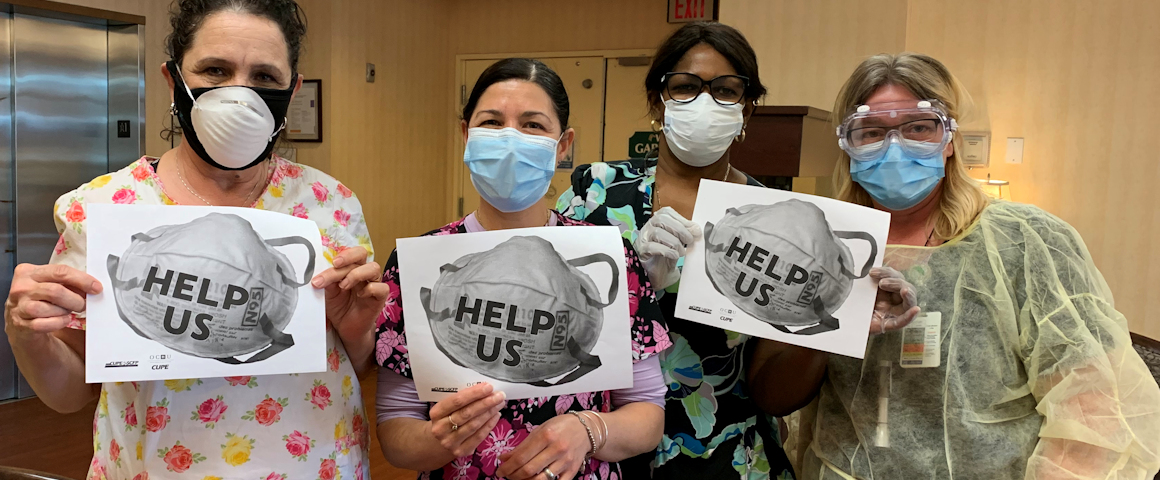The Ontario Health Coalition, which has called for a full public inquiry into the province’s response to COVID-19, has responded with some caveats to the Ford government’s May 19 announcement supporting an independent commission into long-term care (LTC). The Coalition calls for the commission into long-term care to be under the Public Inquiry Act and fully independent of for-profit long-term care operators. Further, this commission cannot delay immediate action being taken to stabilize and support the workforce to stop the COVID-19 outbreaks that continue to spread in LTC homes across significant parts of Ontario.
“Any long-term care commission must have unimpeachable credibility and operate in the public interest,” noted Natalie Mehra, executive director of the Ontario Health Coalition. “That means it cannot be led or controlled by any partisan (political party) interests or by long-term care owners and operators. It must be transparent and open, not by invitation only. Testimony and research must be on the record and fully available publicly as with formal commissions and inquiries in the past, and the commission must report as quickly as possible.”
The Coalition is also calling for a full public inquiry or commission into Ontario’s overall response to COVID-19 at a later date once the pandemic has stabilized.
“There are a number of issues that warrant investigation in Ontario’s response to COVID-19 overall, not just for long-term care, and these need to happen under the full powers of a public commission,” said Ross Sutherland, coalition chairperson. “These include the response to health and safety complaints and work refusals, the PPE stockpile, approaches to testing/contract tracing/quarantine and laboratories, capacity and processes in Public Health, adequate capacity in public hospitals, infection control orders, accountability and approaches to the shut down. These things cannot be adequately addressed in an inquiry looking at long-term care in isolation.”
In the meantime, there is deep consensus among public interest groups about what needs to be done immediately to support and stabilize the long-term care sector. The Coalition warns that these measures must not to be delayed by the announced commission.
“We need a coherent plan including concrete measures to improve PPE supply and infection control, to stabilize the workforce, and leadership and coordination to stem the tide of infections that is sweeping through our health care facilities,” said Mehra.
In addition to demanding the halt to any expansion of for-profit long-term care, the Coalition is calling for six areas of specific measures:
Better infection control including PPE
“Reusing surgical masks patient after patient, resident after resident, would have been totally unacceptable before COVID-19. Woefully insufficient access to N95 masks continues to be a major problem and there are shortages of other equipment. There needs to be a clear plan from the government to improve the supply of PPE or develop our own. Leaving it to industry to do voluntarily has so far been insufficient. Standards for infection control must be improved and staff need the appropriate equipment and enough supply in order to do them. Staff who are infected must be supported to isolate at home. Testing of all residents and staff must be completed in long-term care homes, retirement homes, and congregate care facilities (and shelters).”
Ramping up testing
“Public hospital laboratories that are not currently doing COVID-19 testing and have unused capacity should be ramping up testing. We need a clear honest plan from the provincial government that assesses our full capacity to test and immediately gets them to start getting the pieces in place to ramp up to our province’s real full capacity the testing, tracking and isolating to stop the spread of COVID-19.”
Addressing critical understaffing in LTC
“The provincial government cannot rely on long-term care homes in crisis to get themselves out of crisis. There must be a coherent plan, led by our government, to step in with a set of coordinated, concrete measures to get staff into the homes that have lost staffing levels due to sickness, having to choose one part-time job, staff leaving etc. Leaving it to the providers to forge voluntary arrangements among themselves is not sufficient. Staff need a permanent improvement to their wages and access to full-time hours.”
Transfers to hospitals
“Where there are long-term care homes in crisis without sufficient staff to provide proper palliative care and proper care for those who are not palliative, residents should be transferred to public hospitals which are not in crisis for safe and proper care, subject to their right to consent.”
Bringing in family caregivers and retired nurses
“As soon as testing/contract tracing capacity and PPE supply are stabilized enough to do so, and training in infection control can be properly done, primary family caregivers need to be able to be involved as partners in their families’ care.”
Instituting a minimum care standard in LTC
“There has been deep consensus for decades that the rising acuity of long-term care residents requires more care. This cannot be left to operators to do on their own and resources, both financial and human, need to be provided to support this. There cannot be further delay in beginning to move to a 4-hour average minimum care level for residents in long-term care to protect their safety and the safety of staff.”
[hr gap=”10″]
Support socialist media!
If you found this article useful, please consider donating to People’s Voice.
We are 100% reader-supported, with no corporate or government funding.




